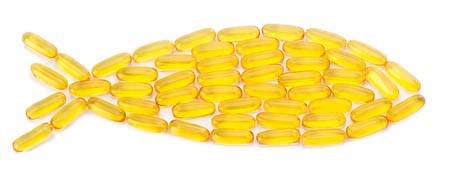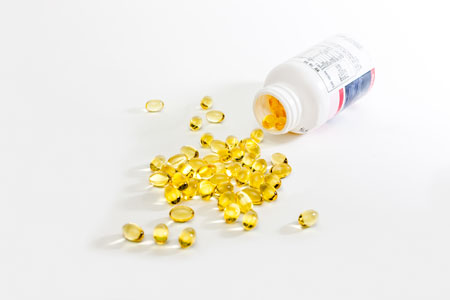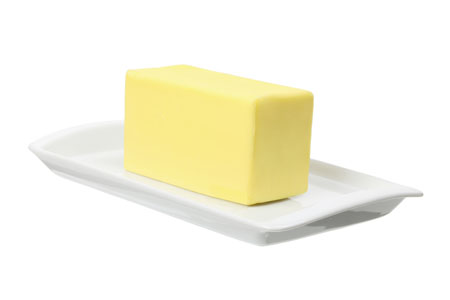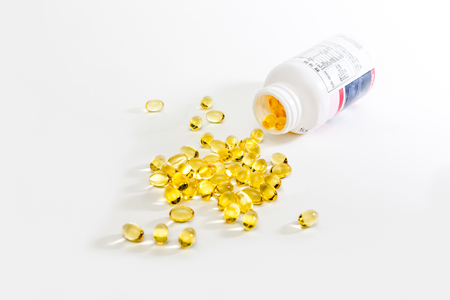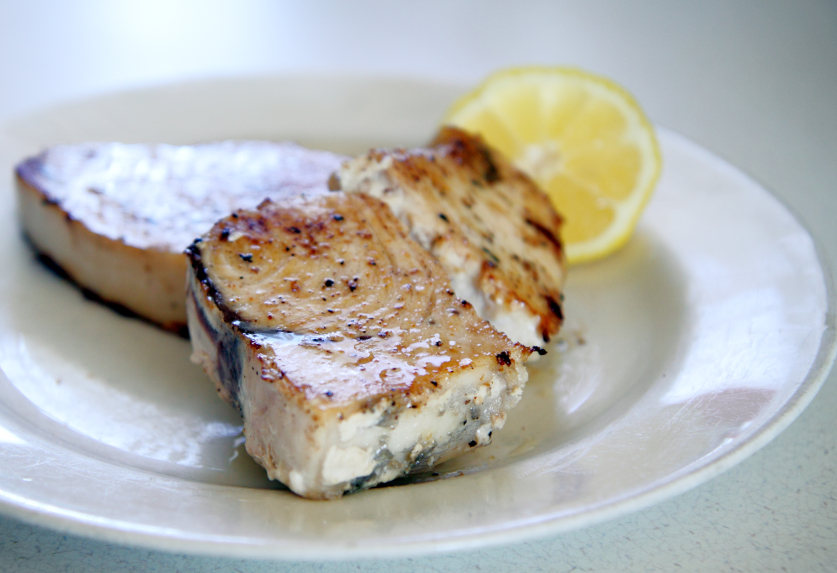Certain ‘Nutraceuticals’ Aid Depression Treatment
A systematic review of research on the value of pharmaceutical-grade nutritional supplements, or ‘nutraceuticals,’ in depression treatment has found that several do indeed improve depression symptoms.
The 2016 review by Jerome Sarris and colleagues in the American Journal of Psychiatry found that the following nutraceuticals primarily produced positive results compared to placebo: omega-3 fatty acids (primarily EPA or ethyl-EPA); vitamin D; l-methylfolate (a more potent form of folic acid); and S-adenosyl methionine or SAMe, a beneficial compound created from toxic homocysteine with the help of folate.
Editor’s Note: Most of these compounds can also be useful in bipolar depression. Omega-3 fatty acids and vitamin D are helpful to many patients. L-methylfolate is particularly helpful to the 30% of the population with a MTHFR deficiency that interferes with the ability of folate to break down homocysteine. SAMe is an exception—while it is effective in unipolar depression, it may cause switching into mania in patients with bipolar disorder.
The researchers identified a few additional nutraceuticals that each had one study supporting their use—creatine, sometimes used by weightlifters to provide extra energy to muscles; folinic acid, which can protect bone marrow and other cells during chemotherapy; and a combination of amino acids.
Results from studies that compared other compounds to placebo were mixed. Those included studies of zinc, folic acid, vitamin C, and the amino acid tryptophan. A study of inositol, a compound found in plants that is not normally digestible, had nonsignificant results.
No serious side effects were observed in any of the studies of nutraceuticals, though some caused minor digestive disturbances.
Editor’s Note: Another beneficial nutraceutical that did not appear in the review article is N-acetylcysteine. In 6- to 8-week studies, NAC improved depression and anxiety compared to placebo. It also improved bipolar depression and reduced many habits and additions in non-bipolar patients. These include cocaine and gambling addition, alcohol and nicotine use, trichotillomania (compulsive hair-pulling) and obsessive compulsive disorder (OCD).
Omega-3 Fatty Acids Associated with Small Improvement in Depression in Children Aged 7–14
At the 2015 meeting of the American Academy of Child and Adolescent Psychiatry, researcher Mary A. Fristad reported that omega-3 fatty acid supplements had a small beneficial effect on depression in children aged 7–14. The supplements did not noticeably improve bipolar disorder not otherwise specified (NOS) or mania. The supplements consisted of several types of omega-3 fatty acids, including 1400mg of EPA, 200mg of DHA, and 400mg of others per day. The children were also undergoing psychotherapy during the study.
Omega-3 Fatty Acids Prevent Conversion to Psychosis
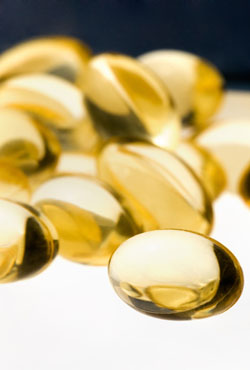 A new long-term study of omega-3 polyunsaturated fatty acids for psychosis prevention shows that almost seven years after a 3-month stint of receiving these dietary supplements daily, adolescents and young adults at high risk for psychosis showed fewer symptoms of conversion to full-blown psychosis than those who received placebo during the same period.
A new long-term study of omega-3 polyunsaturated fatty acids for psychosis prevention shows that almost seven years after a 3-month stint of receiving these dietary supplements daily, adolescents and young adults at high risk for psychosis showed fewer symptoms of conversion to full-blown psychosis than those who received placebo during the same period.
The research team, led by Paul Amminger, originally found that among 81 youth (mean age 16.5) at high risk of developing psychosis due to their family histories, the 41 who received 12 weeks of daily supplementation with 700mg of eicosapentaenoic acid (EPA) omega-3s and 480 mg of docosahexaenoic acid (DHA) omega-3s showed reduced likelihood of conversion to psychosis one year later than the 40 who received placebo.
The team followed up an average of 6.7 years later with 71 of the original 81 participants. Among those who had received the omega-3 intervention, 9.8% had developed psychosis. Among the placebo group, 40% had developed psychosis, and they had done so earlier.
In addition, the omega-3 participants were better functioning, they had required less antipsychotic medication, and they had lower rates of any psychiatric disorder than the placebo group.
Amminger wrote in the journal Nature Communications, “Unlike antipsychotics, fish oil tablets have no side effects and arent’s stigmatizing to patients.”
Editor’s Note: Because of their lack of side effects, a good case can be made for omega-3 fatty acids for patients at high risk for psychosis. The novel thing about this study is that short-term treatment with omega-3 fatty acids had preventive effects almost 7 years later.
People with High Inflammation Respond Best to EPA Omega-3 Fatty Acids in Depression
Omega-3 fatty acids are found in some green vegetables, vegetable oils, and fatty fish. There is some evidence that omega-3 fatty acid supplements can reduce depression, but researchers are trying to clarify which omega-3s are most helpful, and for whom. A new study in Molecular Psychiatry suggests that depressed people with higher inflammation may respond best to EPA omega-3 fatty acids compared to DHA omega-3 fatty acids or placebo. Researchers led by M.H. Rapaport divided people with major depressive disorder into “high” and “low” inflammation groups based on their levels of the inflammatory markers IL-1ra, IL-6, high-sensitivity C-reactive protein, leptin, and adiponectin. Participants were randomized to receive eight weeks of treatment with EPA omega-3 supplements (1060mg/day), DHA omega-3 supplements (900mg/day), or placebo.
While overall treatment differences among the three groups as a whole were negligible, the high inflammation group improved more on EPA than on placebo or DHA, and more on placebo than on DHA. The authors suggest that EPA supplementation may help relieve symptoms of depression in people whose depression is associated with high inflammation levels, a link common among obese people with depression.
Editor’s Note: These data add to a study by Rudolph Uher et al. in which people with high levels of C-reactive protein responded better to the tricyclic antidepressant nortriptylene, while those with low levels of the inflammatory marker responded better to the selective serotonin reuptake inhibitor antidepressant escitalopram.
Omega-3 Fatty Acids Improve Attention in Boys
A new study finds that omega-3 fatty acid supplementation improves attention in boys both with and without attention deficit hyperactivity disorder (ADHD). The study by Dienke J. Bos and colleagues in the journal Neuropsychopharmacology included 40 boys (aged 8–14) with ADHD and 39 demographically matched controls. Participants were given 10 g per day of margarine supplemented with either omega-3 fatty acids (eicosapentaenoic acid (EPA) and docosahexaenoic acid (DHA)) or placebo.
The children who received EPA/DHA supplementation showed improvements in attention (as rated by parents) compared to those who received placebo. Improvement was greater in the children with ADHD. Supplementation did not affect cognitive control or brain activity on functional magnetic resonance imaging (fMRI). Those boys who received omega-3s showed higher DHA levels on followup.
Omega-3 Fatty Acids Improve Mood and Limbic Hyperactivity in Youth with Bipolar Depression
Children who have a parent with bipolar disorder are at risk for bipolar illness, but it may first present as depression. Treating these children with antidepressants has the risk of bringing on manic episodes. Researchers are looking for treatment options for youth at risk for bipolar disorder.
Robert McNamara and colleagues found that 12 weeks of omega-3 fatty acids (2,100 mg/day) significantly improved response rates in medication-free youth ages 9–20 years compared to placebo (64% versus 36%). Omega-3 fatty acids but not placebo also reduced the activation of limbic structures in the brain (the left parahippocampal gyrus) in response to emotional stimuli.
Editor’s Note: These data add to the literature on the positive effects of 1–2 grams of omega-3 fatty acids in depression. Given the safety of omega-3 fatty acids and the ambiguous effects of antidepressants in bipolar depression, omega-3 fatty acids would appear to a good alternative, especially since the FDA-approved atypical antipsychotics (quetiapine and lurasidone) are not approved for bipolar depression in people under age 18.
Ambiguity in the Data on Omega-3 Fatty Acids for Depression
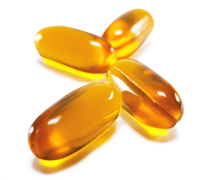 In a recent randomized, controlled clinical study comparing two types of omega-3 fatty acid supplements (one with EPA and one with DHA) with placebo in 196 adults with major depression, there were no statistically significant differences in outcomes across the three groups. The participants received the treatments for eight weeks, and response and remission rates were 40-50% in those receiving either omega-3 preparation (at doses of 1000mg/day) and 30% for placebo. The research was published by David Mischoulon and colleagues in the Journal of Clinical Psychiatry.
In a recent randomized, controlled clinical study comparing two types of omega-3 fatty acid supplements (one with EPA and one with DHA) with placebo in 196 adults with major depression, there were no statistically significant differences in outcomes across the three groups. The participants received the treatments for eight weeks, and response and remission rates were 40-50% in those receiving either omega-3 preparation (at doses of 1000mg/day) and 30% for placebo. The research was published by David Mischoulon and colleagues in the Journal of Clinical Psychiatry.
Low Omega-3s in Children Associated with Poor Cognitive Performance
Omega-3 fatty acids (especially the type known as DHA) are essential for brain development and functioning, but most people eating a modern western diet consume low amounts of these compared to omega-6 fatty acids. Omega-3s are anti-inflammatory while omega-6s are pro-inflammatory. A large UK study published in the journal PLOS One in 2013 reported that healthy 7- to 9-year-olds with lower levels of omega-3 long-chain polyunsaturated fatty acids in their blood (including DHA, DPA, and EPA) had lower reading ability and working memory, and also had more behavior problems.
The oils in fish are the best source of omega-3 fatty acids, and most of the children with poor reading ability in the study fell short of the UK nutritional guideline that recommends eating two portions of fish per week.
Girls in the study had more dramatic deficits in omega-3 levels than boys. In adults, women tend to metabolize long chain polyunsaturated fatty acids more easily than men, but this difference is driven by hormones, and because the girls in the study had not yet reached child-bearing age, they did not reflect this benefit.
Omega-3 deficits in children have been connected with attention deficit hyperactivity disorder (ADHD), and supplementation with extra omega-3 fatty acids in the diet has led to improvements in ADHD.
Fatty Acids in Mood Disorders
Cultures where more omega-3 fatty acids (which have anti-inflammatory effects) and fewer omega-6 fatty acids (which have pro-inflammatory effects) are consumed have a lower incidence of depression and bipolar disorder. However, the exact role that each kind of fatty acid plays in the brain and whether dietary changes can improve mood disorders is still being investigated. A 2012 study in the Journal of Psychiatric Research examined the complete lipid profiles of participants with bipolar disorder to collect data on these questions.
The most significant results to come from the study were that levels of the long-chain omega-6 fatty acid dihomo-gamma-linolenic acid (DGLA) were positively correlated with neuroticism, depression severity, and decreased functioning. Depression severity was negatively correlated with the omega-6 fatty acid linolenic acid (LA) and the omega-3 fatty acid alpha-linolenic acid (ALA), and positively correlated with fatty acid desaturase 2 (FADS2), an enzyme that converts LA to the omega-6 fatty acid gamma-linolenic acid GLA.
The data suggest that particular omega-6 fatty acids and the enzymes that lead to their production may be used as biomarkers that can indicate depression.
Editor’s Note: Levels of specific omega-6 fatty acids and their related enzymes were found to correlate with depression severity in this study. Since omega-6 fatty acids are pro-inflammatory, diets higher in omega-6 fatty acids are associated with more cardiovascular problems, and a 2012 article by Chang et al. in the Journal of Psychiatric Research reported that completed suicides in bipolar patients with cardiovascular disorders were significantly higher than in those with bipolar disorder without cardiovascular illness, it seems a healthy diet can have multiple benefits, including potentially reducing depressive burden, cardiovascular risk, and suicide risk.
Omega-3-Fatty Acids Promising For At-Risk Kids with Depression
 Several studies in adults and children suggest that omega-3 fatty acid supplementation may have antidepressant effects. At the 2013 meeting of the American Academy of Child and Adolescent Psychiatry in October, Melissa DelBello, a professor at the University of Cincinnati, reported on a new study of omega-3 fatty acids in depressed children who had a parent with bipolar disorder. The children taking omega-3 fatty acids were more likely to improve than those taking a placebo, but the findings were only of marginal significance.
Several studies in adults and children suggest that omega-3 fatty acid supplementation may have antidepressant effects. At the 2013 meeting of the American Academy of Child and Adolescent Psychiatry in October, Melissa DelBello, a professor at the University of Cincinnati, reported on a new study of omega-3 fatty acids in depressed children who had a parent with bipolar disorder. The children taking omega-3 fatty acids were more likely to improve than those taking a placebo, but the findings were only of marginal significance.
Cold-water fish are a good source of omega-3 fatty acids, and DelBello said salmon is by far the best in this regard. People who live in countries where fish is consumed in greater quantities are less likely to suffer from depression. Other sources of omega-3 fatty acids include shellfish, plant and nut oils, English walnuts, flaxseed, algae oils, and fortified foods.
The omega-3 fatty acids from fish are eicosapentaenoic acid (EPA) and docosahexaenoic acid (DHA), while the omega-3 fatty acids from plants are alpha-linolenic acid (ALA), which breaks down into EPA and DHA. All of these are anti-inflammatory, though one must consume much greater quantities of ALA to match the benefits of EPA and DHA. In contrast, omega-6 fatty acids, which are much more common in the typical American diet, are pro-inflammatory.
In DelBello’s study of 56 depressed children of a parent with bipolar disorder, the participants were randomized to either 1.8 g of omega-3 fatty acids (1.2 g of EPA and 0.6 g of DHA) or placebo (olive oil). Those who received the omega-3 fatty acids had a 55.6% rate of remission versus 34.5% for those who received placebo, but while the odds ratio of 2.4 favored the omega-3 fatty acids, the difference in remission rates was not statistically significant, likely because of the small size of the study. However, improvement on the Children’s Depression Rating Scale was significantly different across the two groups, with children taking omega-3s improving more. Omega-3 fatty acids are known to have an anticoagulant effect (preventing the clotting of blood), and four children in the study did have prolonged clotting times (but no clinical problems with bleeding).
Editor’s Note: Given the existing literature on omega-3 fatty acids and the trend in this study, omega-3s are worthy of consideration for the treatment and potentially for the prevention of depression in children. This later possibility is further suggested by findings from Australia that, when compared to placebo, omega-3 fatty acids significantly reduced the rate of conversion from prodromal (preliminary) psychotic symptoms to a full-blown diagnosis of schizophrenia.


